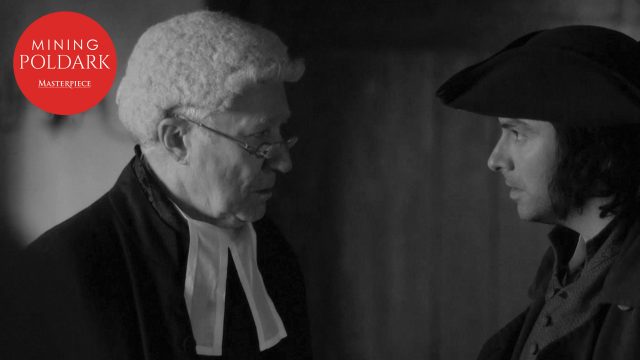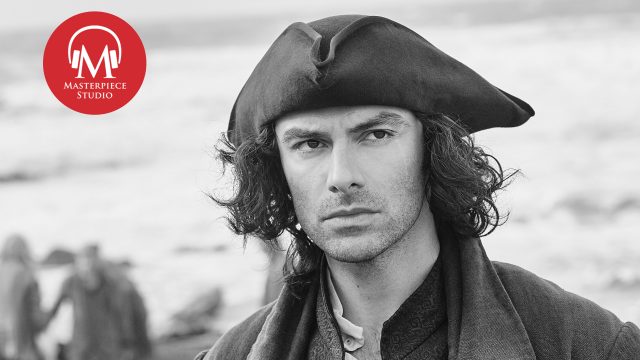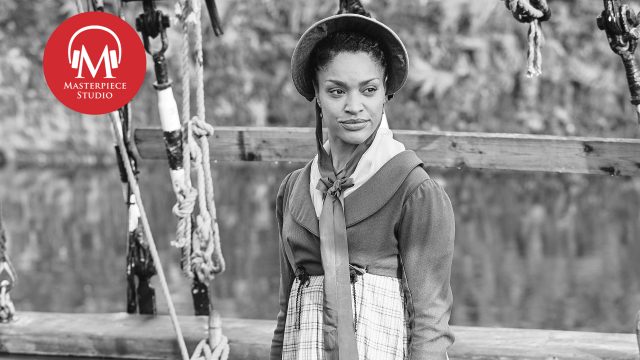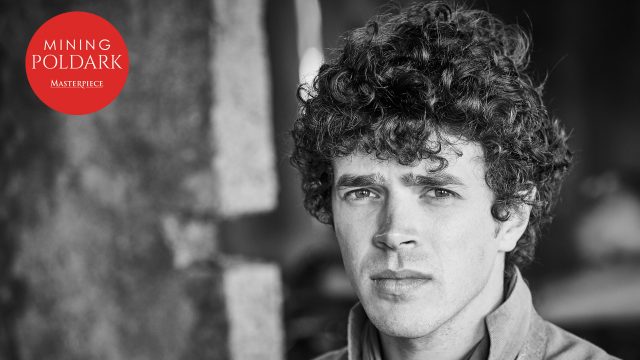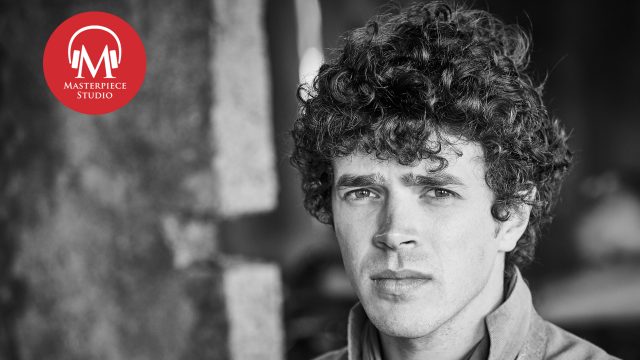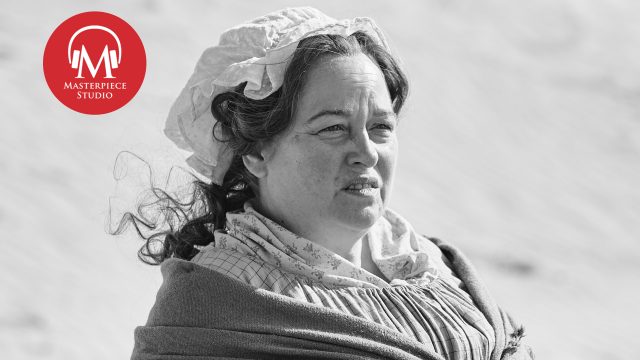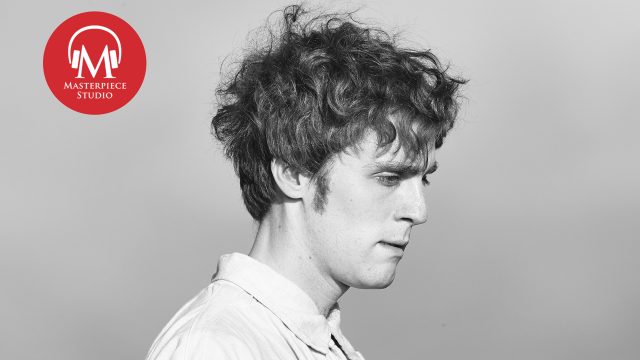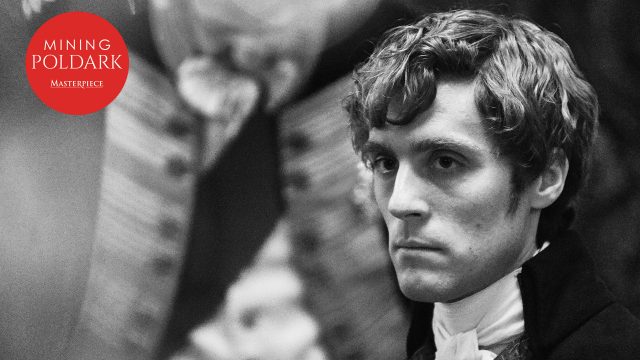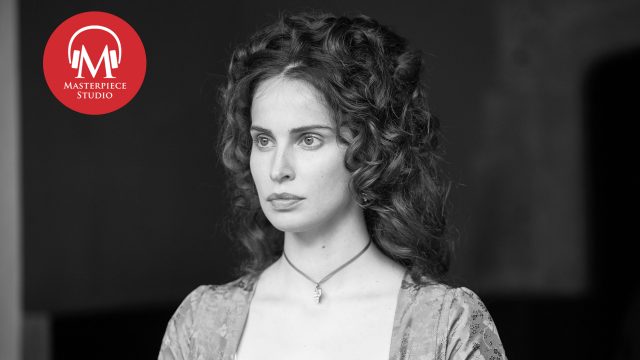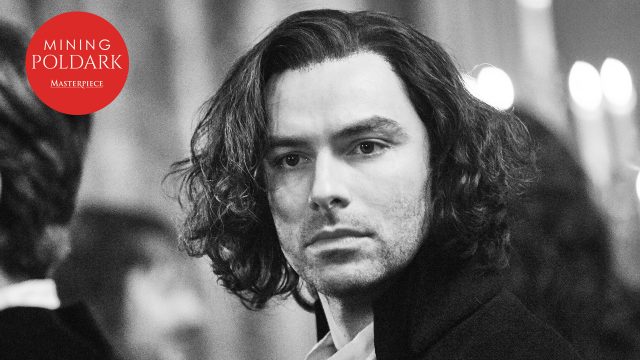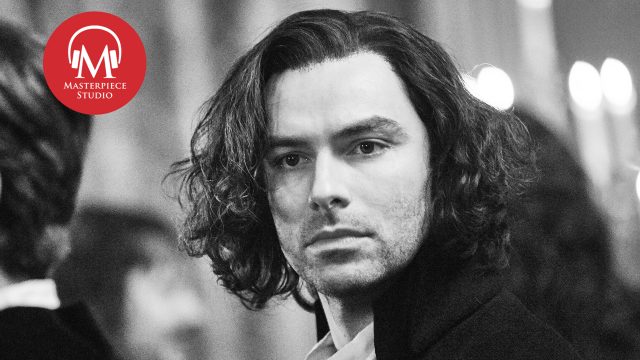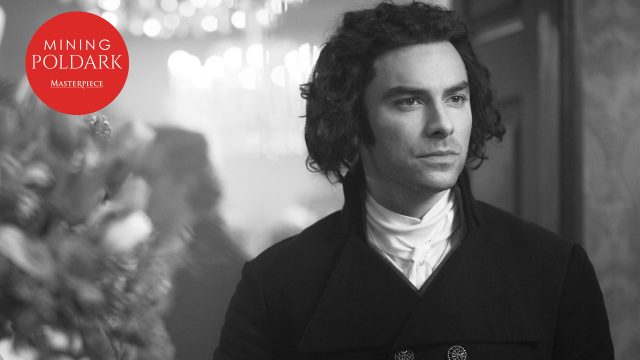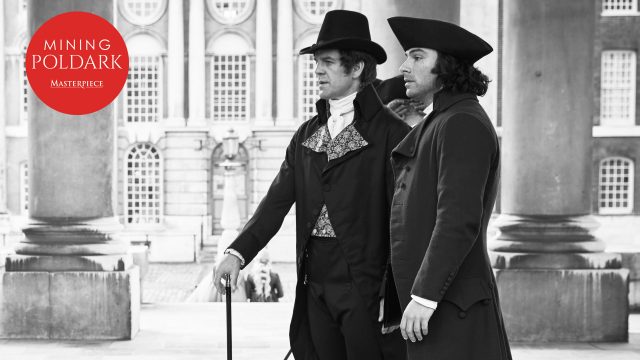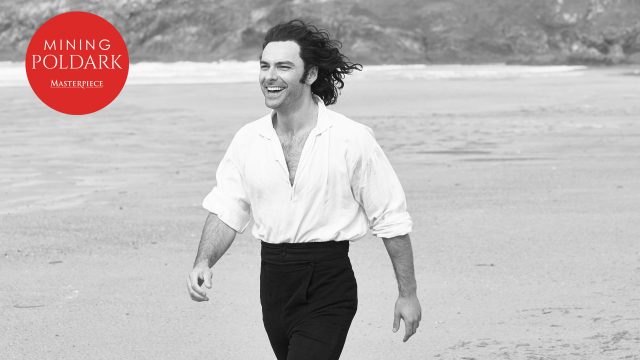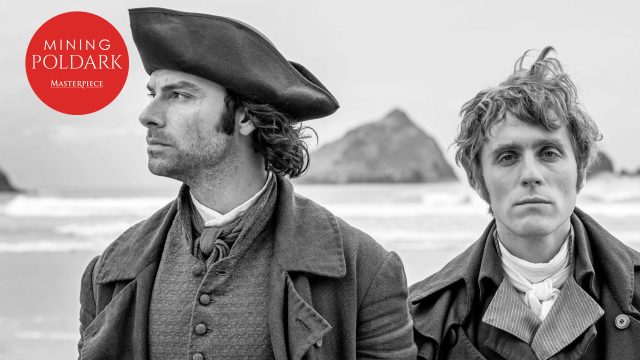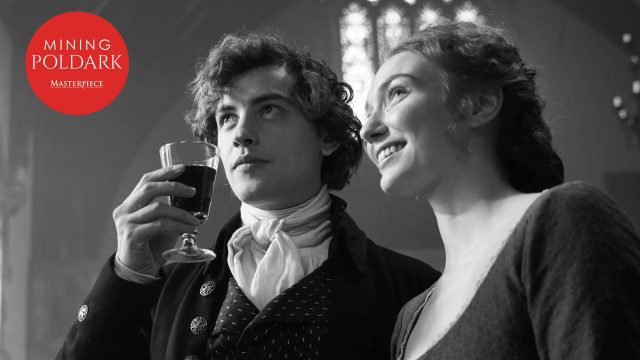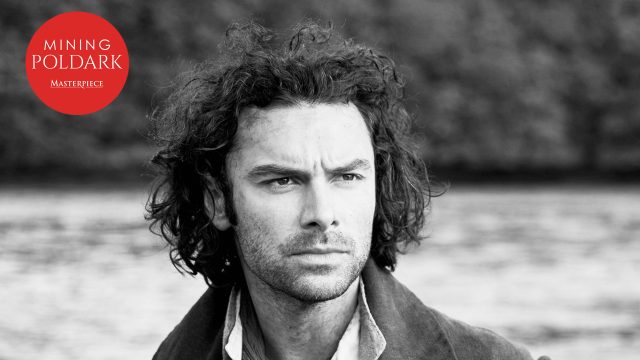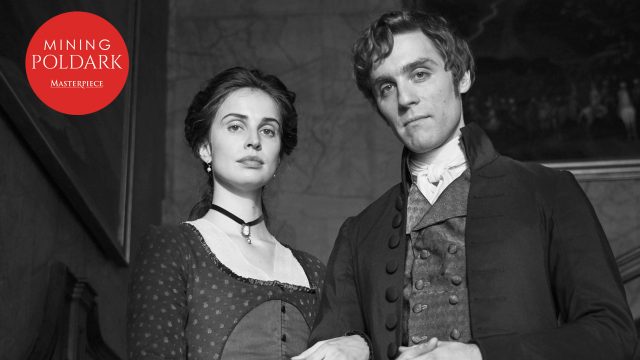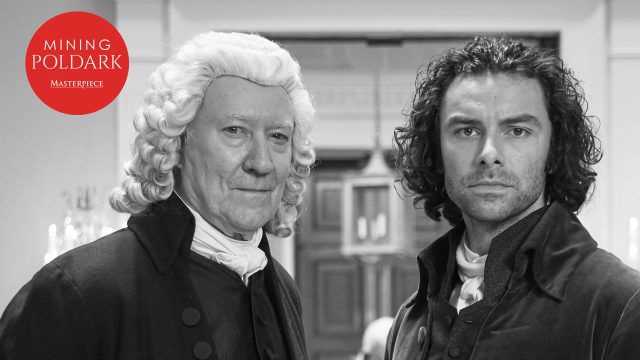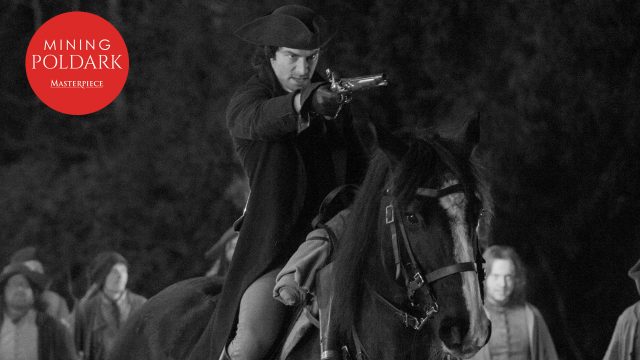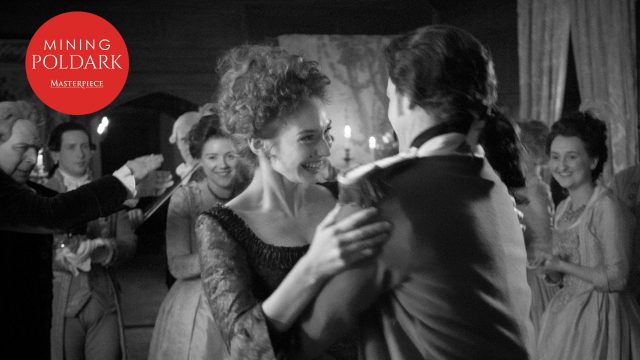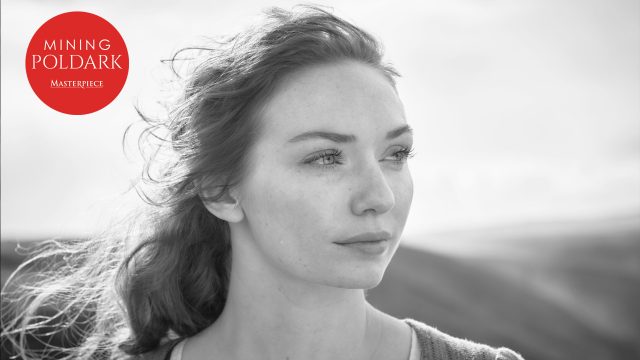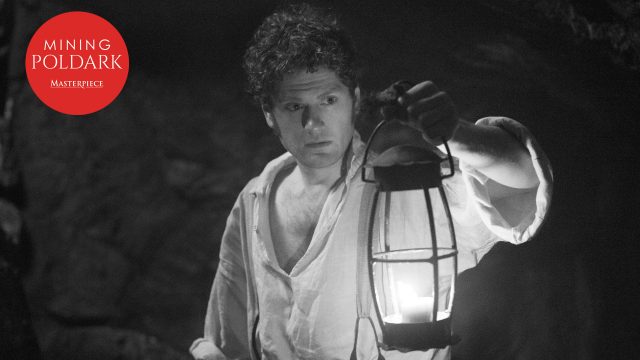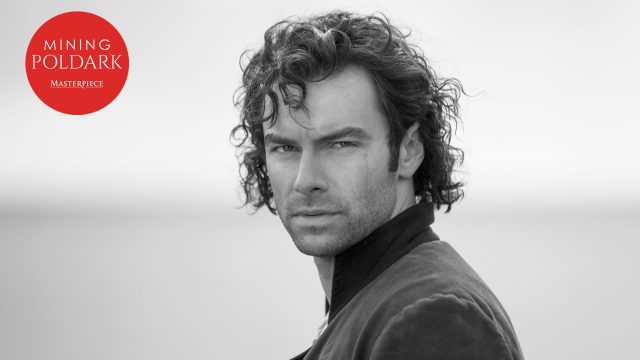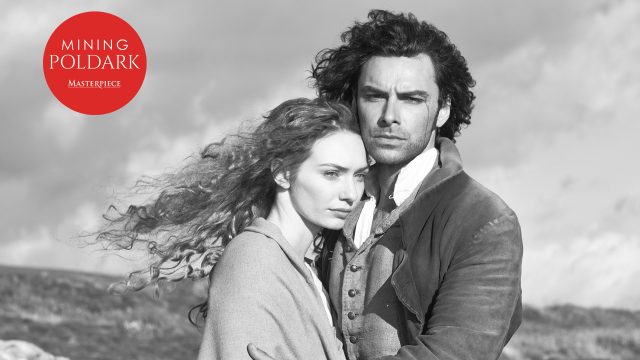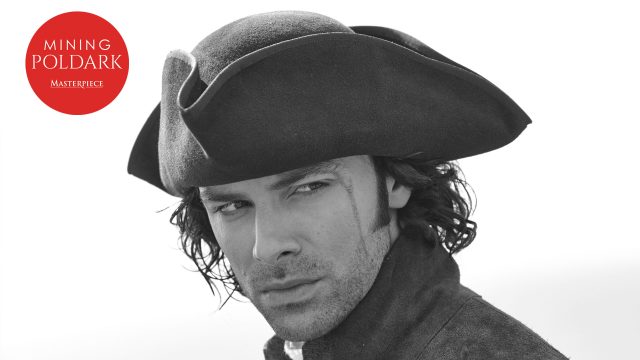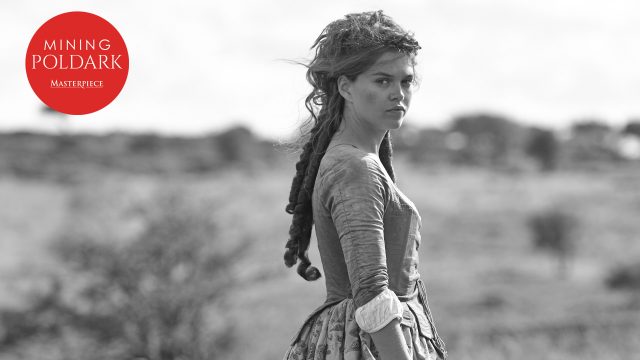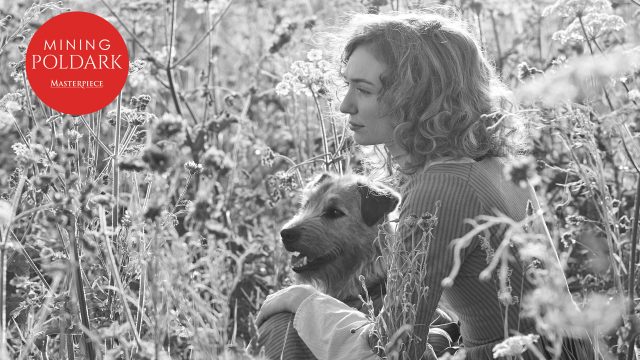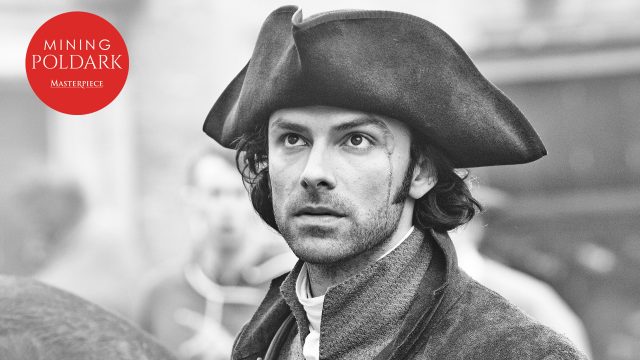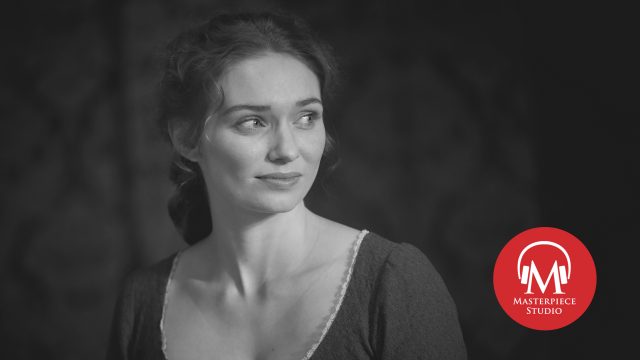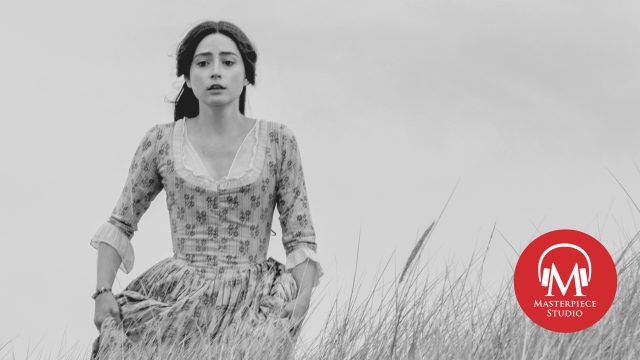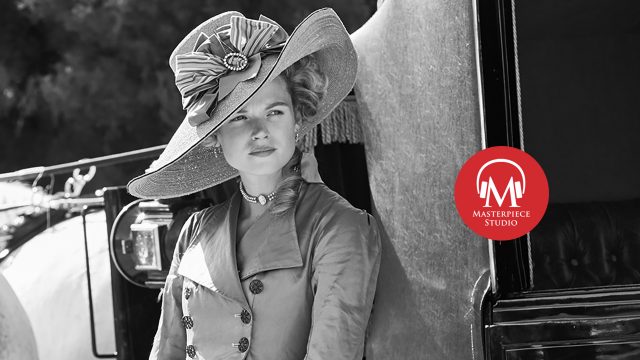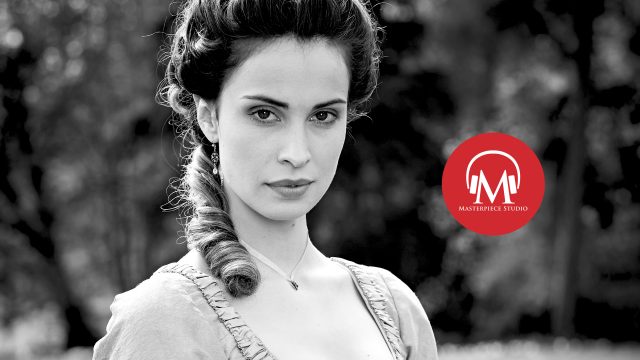Debbie Horsfield is the only writer of every episode of MASTERPIECE’s Poldark, so she definitely knows what’s on the horizon in the series’ fourth season. Secrets, lies and parliamentary politics come to Cornwall in a big way this season. Horsfield — who is also one of the series’ executive producers — offers a sneak preview of the surprises still to come, and reveals why Aidan Turner was always the only actor she would cast as Ross.


Debbie Horsfield Only Had One Man In Mind To Play Her ‘Poldark’
Released
Related to: Poldark, Season 4
Download and subscribe on: iTunes | Spotify| RadioPublic
Transcript
Jace Lacob: I’m Jace Lacob, and you’re listening to MASTERPIECE Studio.
A new season of Poldark kicks off with particularly dire conditions on the Cornish peninsula. Food is scarce, tempers are high, and the Cornish poor are searching for somebody to blame.
CLIP
Crowd: (Rumble rumble rumble)
Woman: Please, stop!
Jace: On top of all this local turmoil, the British parliament has been dissolved, giving Cornish MP George Warleggan a new opponent in the form of the highly decorated Lieutenant Hugh Armitage.
CLIP
George: We were discussing arrangements for the coming election. Pitt hopes to strengthen his hand against those who oppose him.
Jace:Writer Debbie Horsfield is no stranger to big battles — she’s written every episode of the 21st Century adaptation of Poldark — and as she tells us, in the season yet to come, there will be clashes both political and romantic.
Debbie Horsfield: Ross does go to Parliament…the rivalry between him and George will continue and that there will be turbulent times in back in Cornwall that Demelza will be needing to deal with.
We spoke to Horsfield about updating this classic series for a contemporary audience, finding nuance in Ross and Demelza’s complicated marriage, and how she always only had one actor in mind to play the roguish Ross Poldark.
Jace: And this week we are joined by Poldark creator Debbie Horsfield. Welcome.
Debbie: Thank you.
Jace: How did you become involved with Poldark initially?
Debbie: Well, I was sent the first two books by Karen Thrussell, from Mammoth Screen, and I didn’t know anything about the books. I hadn’t watched the series when it was on in the 70s, so I was kind of taken completely by surprise, really. And I took the books on holiday with me and I think I probably read about three pages before I thought, ‘Wow, this is great storytelling. I think I’m in here.’ So, it was a very quick and easy decision, actually.
Jace: Is it true that Poldark is not only your first adaptation but also the first period drama you’ve written?
Debbie: If you count if you count in the 1960s as a period drama, I did something that was set in the 1960s, but other than that, yes it absolutely is, and it’s certainly my first adaptation.
Jace: Winston Graham wrote 12 Poldark novels so adapting Poldark isn’t as simple as just looking at a single novel. Where you begin with a daunting project like this one?
Debbie: Well, by reading all of the novels, even though at the outset, we had no idea how far we would be commissioned, because we only get commissioned one series at a time. So, you know it could all have been over after the first two books, but I had to take an overview of where the story was going and also just to kind of look at how we were going to divide up the material. In the initial stages, the BBC had commissioned six episodes and it seemed to fit that we did the first two books, but I very quickly realized that there just wasn’t enough room in six episodes to do justice to the to the material. And so I asked them if we could have an extra two episodes, and they thankfully said yes.
Jace: It would have felt so packed in, six episodes of this show in season one.
Debbie: Yeah, I mean I think it’s very, very tricky even now that we have to miss out some storylines or a lot of really lovely detail. But I don’t think it would have been possible at all to do it in six episodes.
Jace: Given how beloved the novels and the original 1970s adaptation are, did you have any trepidation going in with this this new adaptation of Poldark?
Debbie: Well not, not to begin with because as I say I hadn’t seen the the 1970s version, and I hadn’t really been aware of the books, but it was only when the BBC announced that we were going into production and then there was a huge response about that and a lot of people going ‘Oh it’s not going to be as good as the 70s version.’ Then I realised quite well I’d sort of bitten off I think at that point. Up until that point it was all great because I had no idea that I was up against anything. Only when it was announced did I think, ‘Oh….what have I done here?’
Jace: You’ve likened Poldark to a quote, ‘British Gone With The Wind.’ What did you mean by that, exactly?
Debbie: Well I mean that like Gone With The Wind, it’s a family saga, actually. It’s a story of of love and passion and rivalry set in a very turbulent time in history. But ultimately it is about human relationships that are being dealt with in the midst of huge upheaval. And I think for, obviously Gone With The Wind falls into that category and I think the Poldark, novels, you know, Ross returns from the American Revolutionary War and the the novels take you through many years which encompass the French Revolution the near English Revolution, the Napoleonic wars. It’s a great broad canvas, but ultimately it’s a story of human relations and the things that engage us I think what engage any audience, whether it’s the 18th, 19th, 20th, 21st century. It’s the old, you know, the love triangle, the business rivalry, they’re trying to stitch your rival, all that kind of thing. It’s it’s kind of a gift, really.
Jace: Cornwall functions here at times as sort of microcosm for Britain as a whole given as you say the turbulence of the time period in which Poldark is set. Do you see the show as a sort of condition of England story?
Debbie: I think Winston Graham intended the books to be that in a way that Charles Dickens also intended his books to be a comment on the, you know, the current state of the nation, even though they were very much character driven as well. Winston Graham did impeccable research so when I first started out, I was double-checking to see if there was more information to be got on a particular thing, like mining or the whole process of selling the ore, right through to you know what the diseases that are current in the day were what the medical treatments would be, and I didn’t need to do any research. I very quickly discovered that Winston Graham had done it all, and it was all impeccable.
Jace: True or false: you had a shortlist of only one actor to play Ross Poldark?
Debbie: Yeah, that is absolutely true. I normally don’t think about casting ‘till quite late on in the process. But I realized quite quickly that a kind of spectacular performance would be needed to basically bring to life this really complex and charismatic character. So I started thinking to myself, ‘Who might this be?’ And I wrote one name down in my notebook and then said nothing to anybody else because I was thinking well probably no one will agree with me. And unbeknownst to me, Damien Timmer from Mammoth was having exactly the same thought, and it all came together one afternoon when we were on a recy in Cornwall. We are actually riding across Bodmin Moor in the fog. And I said, ‘Well who would we cast?’ And Damian sort of whispered this name. And I went, ‘Oh my God, that’s who I think it should be, too!’ And so we kind of hugged each other in the back of the car and got so excited because we kind of realized we were on to something. And I have to say, I think we were right.
Jace: I think you were right. What is it precisely about Aidan Turner that makes him such an ideal Ross?
Debbie: Well I had seen Aidan in Desperate Romantics and I had seen him in Being Human. And obviously those roles are very different to each other and their roles are very different to Ross. In both he was playing an outsider. I think a kind of rebellious character, someone who didn’t conform someone who wasn’t Orthodox, someone who was very charismatic, strong, but also very, very vulnerable and very human. And I just had an instinct that those were the qualities that would bring Winston Graham’s Ross to life. And I think the rest is history, really.
CLIP
Bassett: You surely see that an example must be made. The harsher the lesson, the greater the deterrent.
Ross: We are talking about men’s lives.
Bassett: Sometimes a man’s life is what is required in order to deter others from following in his footsteps.
Ross: Many a man has been reprieved at the foot of the scaffold. We both know who has the power to make it so.
Jace: You mentioned the fact that the narrative also functions sort of looking at universal and timeless themes like love triangles, business rivals. Is that the reason why you feel this narrative works so effectively today that, that these concerns of the characters or the concerns that we all have regardless of what period we’re living in?
Debbie: Yes absolutely. When we started out you know, people were going, ‘Well you know is it going to be updated?’ I was going, ‘Nothing needs to be updated, everything is relevant.’ I mean, who knew, for instance, that the story of the greedy conniving bankers would be so topical? You know, you don’t have to do any updating for that. And as I say you don’t have to do any modernization of of a love story. I mean, the, you know, the kind of almost Cinderella-like story of of Demelza, but then there’s the fact that there is Elizabeth always there in in the wings, a little piece of Ross’s heart will always be hers. You know, those are universal themes that I think everybody can can relate to. Everybody’s had had the experience of the first love, the one that got away which is what Elizabeth and Ross were for each other.
Jace: You mentioned the Cinderella story of Demelza. What do you feel has been the biggest departure in your adaptation from Winston Graham’s novels?
Debbie: One of the wonderful things about the novels is there are often very long and detailed internal dialogues going on where, you know, characters voice their own thoughts, which obviously you can’t do in a dramatization. I mean you could, I suppose, have voice-overs but that’s just not a technique that works. So one of the big challenges was how to how to bring those internal thoughts and articulate them in in dialogue. So for instance, you know, would have maybe Demelza, after Ross’s encounter with Elizabeth, raging in the book, she is described as raging but in her thought she is raging. Now, you have to find a way to show that. And the moment you start to vocalize it, it actually seems to become more brutal, more strident than you might have imagined it in the book. And I think that’s been one of the the challenges to be asked to basically give form to what the internal thoughts are of the characters. We’ve had to lose a lot of the subsidiary characters which is a great shame but we did take the decision very early on because there are so many amazing stories but we we didn’t have the space, we didn’t have 20 episodes per season so we had to lose some of those stories and we took the decision that we would always put Ross at the center of every story. Once he’s married to Demelza, then Ross and Demelza are a team, a partnership and they are therefore at the center of every story. I think one small departure is that in the books there are times when Demelza becomes less active in the storylines. I don’t mean that she is inactive, but that she is when she is married to Ross, she has less agency in terms of a story and we felt that it would be a shame if she was not center stage in the same way she had been in series one. So I think we have brought her more central to every narrative in a way that she perhaps isn’t so much in the book. But we felt that that was necessary, because she is, after all, she and Ross are our central characters.
Jace: And she doesn’t fall into that sort of trope of being the dutiful housewife but instead she sort of emerges as this proto feminist character.
Debbie: She’s an extraordinary character. She is the daughter of a brutal man who beat her, but she’s a survivor. So first and foremost, Demelza is a survivor. That means that there’s a lot of stuff she isn’t going to take lying down. I don’t think she’s banging any particular drum here and we’re not trying to do that but we are working with the fact that she has survived a very harsh and brutal upbringing and she sometimes encounters challenges which other women of her station possibly wouldn’t be up to the challenge of. But she is.
CLIP
Demelza: Judas, I could crown Ross.
Caroline: He could hardly refuse. Sir Francis seemed most eager.
Demelza: You don’t understand, my father and brothers worked in his mines. Now he’ll be under my roof.
Caroline: Do you suppose he’ll send you to eat in the scullery?
Demelza: I’d think I’d prefer it.
Jace: What has surprised you in terms of where the show’s narrative has gone, and what the fan reaction to it has been?
Debbie: I can remember us going to watch a screening of the very first episode of series one. We had all of our family and friends there so we kind of knew there would be a warm reception but then we did a screening in Cornwall which was the first time we had what I would call a neutral audience, and it was only after that that we began to think maybe we were on to something, because the response was so positive. You never know when how something’s going to go. You can never pre-empt or predict what an audience response is going to be. I’ve been in this business for 35 years. You put the same amount of love and care and attention and detail into everything that you do. And sometimes it gets great reaction, and other times it gets a lukewarm reaction and it bears no resemblance to how much you love the project, because I don’t take on a project that I don’t love, and I think that would be the case for the cast as well. But we were very, very pleasantly surprised by how positive the response was. We realized very quickly that there was a fanbase before we even went out. During the first season’s filming, often when we were filming in outdoor locations, there would be lots of fans there. coming to you to watch us filming and that has grown with every series.
Jace: Before this next question, a quick word from our sponsors…
Viking. Viking’s new ocean fleet is designed with all veranda staterooms for just nine hundred thirty like-minded guests. By River and by Sea. More at Viking Cruises dot com
Jace: You’re the sole writer on Poldark. Is it a luxury getting to write all of these scripts yourself?
Debbie: I always do write everything that I write. I mean normally I write my own original series, contemporary series. I haven’t ever shared the writing duties with anybody. So it’s kind of the norm for me. But I think what what I love about it is that enables me to have them have an overview of of the story as a whole rather than having to just pick out certain chapters of the book and to do justice to those it enables me to have you know to see the full picture, really.
Jace: Now we know there’s a fifth season on tap. Did you approach writing this fourth season in terms of it potentially being the penultimate season of the series?
Debbie: I think I always approach each season thinking it’s self-contained and may well be the last because that’s all you can do. You know seasons are often cancelled after one series. So I try to just do justice to the books that we have chosen for that particular series, and not make any assumptions that were going to go any further. It’s always been wonderful to be told that we are able to go further, and likewise we’ve been told we can do a series five.
Jace: This season, spoiler alert, finds Ross outside of Cornwall in the corridors of power in Westminster. How does that sense of distance and that separation from Demelza define this season as a whole?
Debbie: Yeah very, very much so because obviously, we have seen Ross as a man who has strong convictions and is a man of action and that action, other than the excursions to France, which we saw in series three, it’s been very centred on Cornwall, but he is beginning to realize that if he wants to change things for the better, it has to be he has to go beyond Cornwall and so this series four is about how he manages to juggle those two worlds, and sometimes it’s quite tricky. I mean, obviously, he misses Demelza and his family very much, but it’s also about how he fits in with London society. It’s how he fits in as an MP. Does being an MP answer everything he hoped it would? That’s one of the questions that we ask in this series. Does he get what he expected? Is he able to achieve the things he set out to achieve? Meanwhile Demelza is back at home and dealing with the things a lot of the things that Ross would have dealt with in his absence she then is the person supervising the house the farm the mine the family. So she’s got her work cut out, as well.
Debbie: Why is Ross so resistant to the idea of standing for Parliament, even now after he sees what George has done with his power and what his own stubbornness has cost?
Debbie: I think there’s various reasons but one of the key ones I think is that MPs in those days, it was a career move. It wasn’t done for most people in order to make the world a better place. So there was a massive amount of corruption and exploitation surrounding being an M,P and Ross despises all of that, doesn’t want to be tarred with that brush and feels that he isn’t sure that there aren’t better ways of doing what he wants to do. He in the end realizes that there probably aren’t any better ways, so he’s got to take that step. But the resistance I think is genuine in as much as he doesn’t want to be part of this very kind of corrupt and exploitative world.
Jace: Demelza’s affair with Hugh last season was controversial. What was behind her decision to give herself to Hugh and had things played out differently, would she have remained faithful to Ross?
Debbie: You know in the books there are many reasons given it’s not just one reason. We try to convey the ambiguity that the books present so beautifully. There is so many factors. Obviously he’s a complete opportunist, but a charmer. He does give her attention in the way that Ross isn’t really great at doing. You know, she’s only young, she and Hugh are right about the same age. She’s never been courted or romanced in that way. I think she’d get swept off her feet a little bit. She is sexually attracted to him. But I’ve always thought that if he’d called on a different day at a different time it wouldn’t have happened because it was simply a combination of circumstances, on that particular day and it never happens again.
Jace: I love the scene between Ross and Demelza where he asks, ‘Do you think there’s room in a woman’s heart for two men?’ and Demelza replies, ‘Or two women in a man’s?’
Debbie: Yes.
Jace: Is this the source of all of their issues that for Ross, no man wants his wife to be the one that other men possess?
Debbie: Who does? What husband does want his wife to be possessed by anyone else, what wife wants her husband to be possessed by anyone else? I think that what’s very interesting about many people’s response to that story in the books as well as in the series is that so many people I’ve talked to are so disappointed that it ever happened, Funnily enough they sometimes cut Ross a bit of slack because they say you know it’s his. It was his first love. But people can be quite harsh on Demelza and say Oh, she’s really disappointed me.’ What was Winston Grahame thinking of? There’s many theories you know maybe you wanted to even even the score. Maybe he wanted Ross to feel what you feel what Demelza felt. What’s wonderful is that there is so many options and so many discussions possible and I could debate it all day with people, and often do.
Jace: Last season found Elizabeth essentially drugging herself with laudanum but she seems far more comfortable in her marriage to George this season. What’s changed between these two? Has Elizabeth perhaps finally accepted her fate?
Debbie: What was interesting is a lot of people reacted quite strongly to the fact that she took a few drops of laudanum now and then. The fact is laudanum was used very, very frequently. We weren’t trying to suggest that Elizabeth was becoming an addict, more that she was just needing a little help sometimes to acclimatize herself to life with George. But yes, I think in many ways George and Elizabeth are really well-suited. Elizabeth actually wouldn’t really I think have been able to make it work with Ross, in you know, pokey, dark Nampara where she’d be expected to skin rabbits and make bread. And George can give her the kind of lifestyle, and more importantly, for her children, because the children are really important to Elizabeth, and she wants to secure their future. And George is able to do that. And it’s not just about the fact that she can wear the latest fashions and go to London. It’s that it assures not just her place in society, but her children’s place.
Jace: A big highlight of this episode is Ross’ My Lords speech. What does this speech reveal about Ross and about the nature of mercy.
CLIP
Ross: My lords. When we send a man to meet his maker, we must be very certain not only of his guilt but of our motives in doing so. Is our aim to see justice done, or is it to terrify people into submission?
George: This man has no authority here, he has no right.
Bassett: Let him speak.
Ross: My lords, I admit. These are difficult times to be merciful. When authority is challenged, our impulse is to reassert it in the sternest way possible. But consider, here, we face conditions that are harsher than we have ever known. Grain is shipped abroad while ordinary people stave. These men have no grievance against authority, but against the merchant who grow fat on trade while people die.
Debbie: Ross leaves it quite late, obviously, before he before he intervenes because I think he can’t quite believe that Bassett isn’t going to stop things sooner when he realizes that he’s not, he has to step in. I think you know this is typical Ross. When we when we send someone to their death we have to be very careful we’re doing it for the right reasons and he is pointing out he’s suggesting that this is not for the right reasons. In fact in that period historically the prime minister, Pitt, had introduced all kinds of very, very suppressive laws designed to stop precisely the kind of, you know, riot or protest that we see in the first episode. And because because at this point, we’re in a period in which it was genuinely feared there would be an English revolution to follow the French Revolution and so those very suppressive measures are again an example of Winston Graham’s impeccable research.
Jace: The episode is bookended by Ross’s vision of Demelza and Hugh. And our quote, ‘indispensable, irreplaceable Demelza’ wrapping her arms around Ross by the fire. What do these two moments in particular say about the narrative and where these characters might be headed?
Debbie: I think if we look back to season three, I think it was a really difficult season to watch from Ross and Demelza’s point of view, because there was so much miscommunication. They literally could have solved so many problems if they had actually talked to each other at the right time. What I think is wonderful about Winston Graham’s depiction of their marriage is that it feels absolutely real to me. The Ross and Demelza and the romance and passion that we saw in series one is wonderful to watch, but it’s not realistic to expect that that will be there in every episode. So we were very conscious in Series three that that it was going to be quite difficult to watch them going through those those kind of trials and tribulations of misunderstandings, and miscommunications but that scene at the end of episode one basically articulates all of that. ‘If only we had talked more,’ is what they are both saying. ‘How have we got here? We should’ve talked more.’ And reaffirming the love for each other which is actually at the heart of all 12 books.
Jace: In the broadest possible strokes, what can viewers expect from the rest of this fourth season?
Debbie: Well obviously they can expect that Ross does go to Parliament. I think that’s no secret. I think there’s been lots of pictures of him in his New Regency fashions. They can expect the rivalry between him and George will continue and that there will be turbulent times in back in Cornwall that Demelza will be needing to deal with but they can also look forward to happy reconnections, shall we say, not just on the Ross and Demelza front.
Jace: Debbie Horsfield, thank you so much.Debbie: Thank you.
Jace: As Lord Falmouth preps the ailling Hugh Armitage to run for parliament, Hugh’ health continues to worsen. But as his eyesight fades, his passion for Demelza only seems to intensify. It’s a love and a drive that actor Josh Whitehouse struggled with.
Josh Whitehouse: Sometimes as an actor you know, you need to cry or have a tear in your eye and it could be quite difficult. But it was definitely easier to summon up a lot of that for these scenes just because it felt pretty emotional.
Jace: Whitehouse joins us here on MASTERPIECE Studio next week to look at Lieutenant Armitage’s lingering love for a woman he’ll never truly capture.
MASTERPIECE Studio is hosted by me, Jace Lacob and produced by Nick Andersen. Elisheba Ittoop is our editor. Susanne Simpson is our executive producer. The executive producer of MASTERPIECE is Rebecca Eaton.
Sponsors for MASTERPIECE on PBS are Viking Cruises and The MASTERPIECE Trust.
Poldark Podcasts 68 More Podcasts
MASTERPIECE Newsletter
Sign up to get the latest news on your favorite dramas and mysteries, as well as exclusive content, video, sweepstakes and more.











